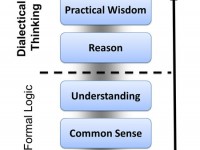The essence of the cognitive dimension of CDF has to do with how adults differ in making cognitive sense (rather than meaning) of their life and work experiences, thus with what they do and do not understand about the real world. These differences go far beyond “what is in the head” since how people construct the world conceptually precedes their actions in the world, and thus equally manifests in their activities, planning, goal setting, decision making, and execution of leadership functions. In most general terms, students learn to switch from “what” to think to “how” to think, thereby gaining fluidity of thinking based on an awareness of their present way of thinking that makes some things “unthinkable” to them. In this life-changing course, students gain insight not only into the theory of cognitive development and the development of dialectic, but also begin to apply dialectical thought forms in text analysis, in cohort discussion, and in coaching interventions with individuals and teams. Read more Read More...
Tag: cognitive Fluidity
Case Study I (b): Practicum in Dialectical Thinking and Listening
This course leads participants from merely talking about dialectical thought forms to interactively eliciting them through a semi-structured interview and evaluating their use based on relevant fragments from a client interview. The program offers students the opportunity to show themselves and others that they have not only mastered “developmental theory”, but also know how to use it in practice. For the student, writing a the case study involves: Completing a 1-hr semi-structured cognitive interview following the protocol of the “Three Houses” (possibly in a modified form) Transcribing the interview(s) into English for discussion in the study cohort Selecting 30 structurally relevant fragments of the interview conducted Based on these fragments, presenting in class a coding sheet describing how the client’s cognitive profile is to be evaluated, for discussion in the study cohort At the end of the course, gathering and submitting all pertinent materials making up the case study to the Director of Education for personal feedback on scoring and focusing of client feedback. Read more Read More...
Cognitive Fluidity – Its Etymology and Nuance
By Brendan Cartmel - The following article takes an important step, in my view, toward clarifying the relationship of Laske’s Dialectical Thought Form Framework to discussions of “integral thinking” in the sense of Wilber and his students. The article points to the gaps in what is called “integral” thinking relative to DTF and further differentiates what is concretely happening in using dialectical thought forms (DTFs). Otto Laske Background to Terms Cognitive Fluidity is the generative mechanism unlocking human potential and driving the evolution of human functioning; so says evolutionary anthropologist Steve Mithven. Cognitive and Social Intelligence are subsequent products of our Cognitive Fluidity. Mithven’s Cognitive Fluidity has correlates with JL Moreno’s idea of Spontaneity and Creativity being the main forces forming the cosmos and fluidising our cognition. What then are the origins of, and the concepts we imply, when we use the term Fluidity? Fluidity & CDF Dialectic Fluidity is a key metric in Otto Laske’s Cognitive Developmental Framework (CDF) and a key factor when designing Inter-developmental (IDM) consultation and coaching strategy. If Dialectic Fluidity is so important in understanding cognitive potential, what do we imply when we use the term Fluidity? What is the source of the term and... Read More...
Review of De Visch’s “Mind(s) Creating Value”
J. De Visch's Leadership-- Mind(s) Creating Value J. De Visch's Leadership-- Mind(s) Creating Value Jan DeVisch continues to plow the depth of dialectical thinking to restructure and refine corporate conversations. This writer is excellently prepared for the task, since his professional career has long been focused on issues of global concern both for and regarding large organizations. Read More...
Autonomy of the Cognitive Line
This article shows dialectical thinking to be a natural outcome of cognitive development, surpassing formal logical thinking in its scope, degree of complexity, and holism. “Good thinking” is understood as thinking aware of its own thought form structure. This view is further substantiated by discussing the three strands of adult development including epistemic position. Integral thinking is seen as failing to maintain preservative negation because of privileging breadth-first over depth-first search. Autonomy_of_the_cognitive_line Read More...
